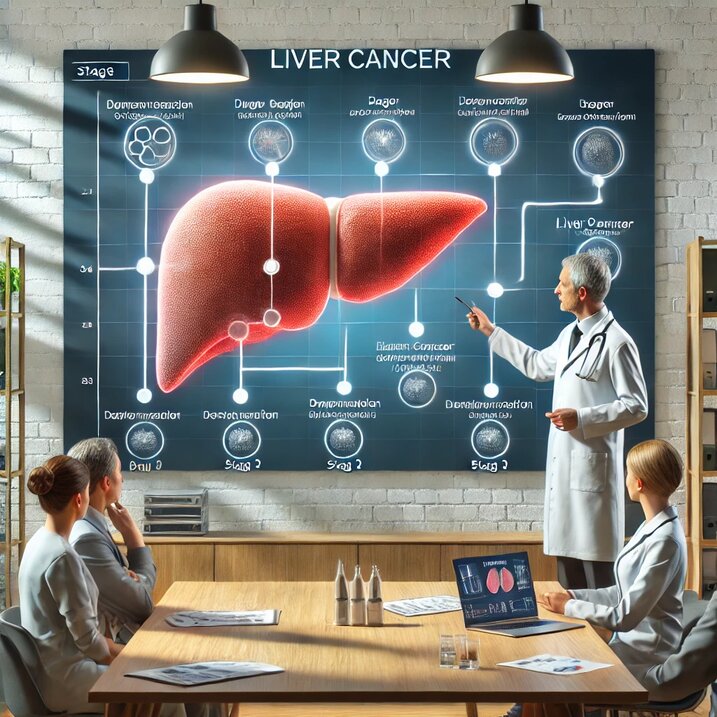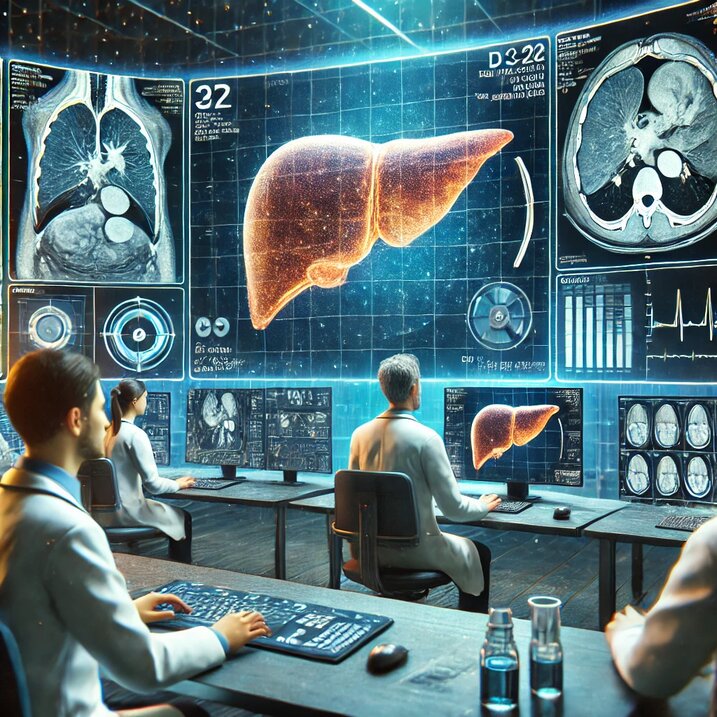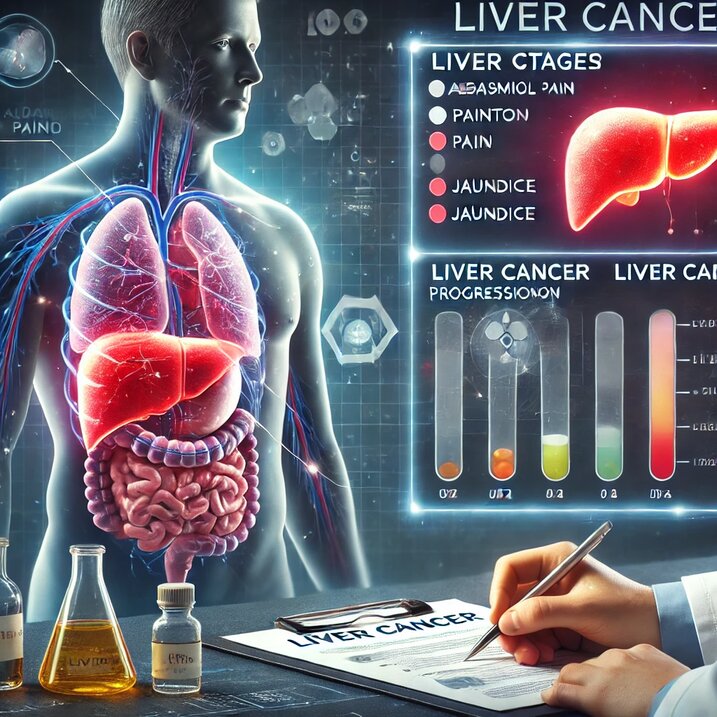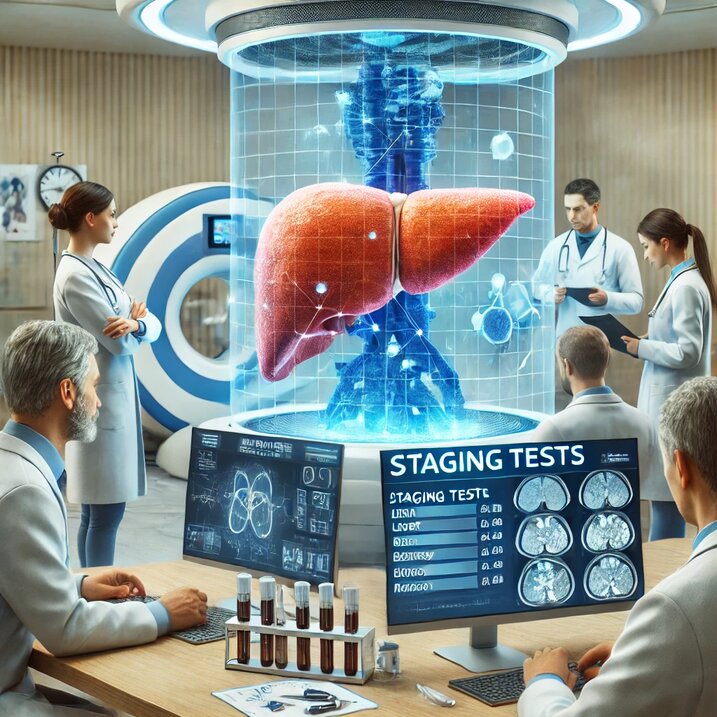What Are the Different Stages of Liver Cancer?
Liver cancer is categorized into four stages that reflect the extent of tumor growth and its spread to other parts of the body. These stages help doctors tailor treatment plans for optimal outcomes:
Medical disclaimer: This content is for general awareness and does not replace a doctor’s consultation. For diagnosis or treatment decisions, consult a qualified specialist.
- Stage I: A single tumor confined to the liver with no spread to blood vessels or other organs.
- Stage II: The tumor may have grown into blood vessels or there may be multiple small tumors.
- Stage III: The cancer has spread to nearby blood vessels, lymph nodes, or adjacent organs.
- Stage IV: The most advanced stage where the cancer has metastasized to distant organs, such as the lungs or bones.
How Are Liver Cancer Stages Identified?
Doctors use advanced diagnostic tools like CT scans, MRIs, biopsies, and blood tests to determine the exact stage of liver cancer. These techniques offer a detailed understanding of the tumor’s size, location, and spread.

Why Is Staging Important in Liver Cancer?
Staging plays a pivotal role in deciding the course of treatment and understanding the prognosis. Early detection often leads to curative options, while advanced stages focus on symptom management and extending life expectancy.
- Localized Stages (I and II): Surgery or therapies like radiofrequency ablation (RFA) may offer a potential cure.
- Advanced Stages (III and IV): Treatments aim to control the disease using options such as targeted therapy or immunotherapy.
How Does Staging Influence Treatment Choices?
Accurate staging ensures the selection of the most effective treatment strategies. For instance, localized cancer may benefit from surgical resection, while advanced cases often rely on systemic therapies.
The Role of Imaging in Liver Cancer Staging
Imaging tests are essential for accurate staging as they provide a clear view of the liver and surrounding areas. These tests help detect tumor size, spread, and overall liver condition:
- CT Scans: Provide a detailed image of the liver to locate and measure tumors.
- MRIs: Offer superior clarity of soft tissues, helping identify cancer spread to nearby areas.
- Ultrasound: Used as an initial tool for detecting abnormalities in the liver.
Why Are Imaging Tests Crucial for Liver Cancer Staging?
Imaging tests not only determine the stage of liver cancer but also guide surgeons and oncologists in planning precise and effective treatments.

Symptoms Based on Liver Cancer Stages
Symptoms of liver cancer vary significantly depending on the stage. Recognizing these symptoms can lead to early detection and timely intervention:
- Early Stages (I and II): Symptoms may be mild or absent but can include fatigue, unexplained weight loss, or mild discomfort in the upper abdomen.
- Advanced Stages (III and IV): Symptoms are more pronounced, including jaundice, abdominal swelling, loss of appetite, and severe fatigue due to compromised liver function.
Why Are Symptoms Often Overlooked?
Early-stage symptoms are subtle and often ignored. Routine screenings for high-risk individuals are essential for detecting liver cancer in its initial stages.

How Are Liver Cancer Stages Determined?
Determining liver cancer stages involves evaluating the tumor size, lymph node involvement, and distant spread. The most commonly used staging system is the TNM system, which categorizes:
- T (Tumor): Size and extent of the primary tumor in the liver.
- N (Nodes): Spread to nearby lymph nodes.
- M (Metastasis): Presence of cancer in distant organs like lungs or bones.
What Tests Are Involved in Staging?
Staging involves imaging tests such as CT scans and MRIs, biopsies, and blood tests to evaluate liver function and detect tumor markers.

Early-Stage Liver Cancer: Implications and Treatment
In the early stages (I and II), liver cancer is localized, which makes it more manageable with curative treatments like:
- Surgery: Surgical resection removes the affected portion of the liver.
- Ablation Therapies: Treatments like radiofrequency ablation (RFA) use heat to destroy cancerous cells.
- Transplant: In certain cases, a liver transplant may be an option for eligible patients.
What Are the Success Rates for Early-Stage Treatment?
Early-stage liver cancer has a significantly higher success rate, with some treatments achieving a 5-year survival rate of over 60%.
Advanced-Stage Liver Cancer: Challenges and Options
Advanced stages (III and IV) are more complex as the cancer has spread beyond the liver. Treatments focus on managing symptoms and prolonging survival:
- Targeted Therapy: Drugs like Sorafenib inhibit tumor growth by targeting specific cancer pathways.
- Immunotherapy: Helps the immune system identify and attack cancer cells.
- Palliative Care: Alleviates pain and discomfort, improving quality of life for advanced-stage patients.
What Are the Prognoses for Advanced Liver Cancer?
Although advanced-stage liver cancer is challenging to treat, therapies like immunotherapy have shown promise in extending survival.
Importance of Regular Screenings for High-Risk Individuals
High-risk individuals, such as those with hepatitis B, hepatitis C, or cirrhosis, should undergo regular screenings to detect liver cancer early. Routine tests include:
- Ultrasound: A quick and non-invasive imaging test for liver abnormalities.
- AFP Blood Test: Measures alpha-fetoprotein levels, which can indicate liver cancer.
How Do Screenings Improve Outcomes?
Screenings enable early detection, significantly improving survival rates by identifying liver cancer when it is still treatable.
The Role of Biomarkers in Liver Cancer Staging
Biomarkers such as alpha-fetoprotein (AFP) play a vital role in diagnosing and staging liver cancer. Elevated levels of AFP can indicate the presence of tumors, especially in advanced stages.
Why Are Biomarkers Important?
Biomarkers provide insight into the tumor's aggressiveness and help monitor treatment effectiveness, making them essential tools for managing liver cancer.
The Impact of Liver Function on Staging and Treatment
Assessing liver function is crucial in determining the stage of liver cancer and selecting appropriate treatments. Tests like the Child-Pugh score evaluate liver health and guide decisions regarding surgery, radiation, or systemic therapies.
How Multidisciplinary Teams Improve Liver Cancer Outcomes
Multidisciplinary teams, including oncologists, surgeons, radiologists, and hepatologists, work together to develop personalized treatment plans. This collaboration ensures comprehensive care tailored to the patient's unique condition.
Why Is Collaboration Essential?
A team-based approach improves outcomes by combining expertise, enabling better diagnosis, treatment planning, and follow-up care.
The Importance of Patient Education in Liver Cancer Stages
Educating patients about liver cancer stages empowers them to make informed decisions about their treatment options. Understanding the implications of each stage can alleviate anxiety and foster active participation in care.
Liver Cancer Treatment Effective Therapies
Liver cancer treatments have advanced significantly, offering tailored solutions for patients at different stages of the disease. Below are four highly effective therapies widely used in India:
Radiofrequency Ablation (RFA)
RFA therapy for liver cancer is a minimally invasive treatment that uses heat to destroy cancer cells in the liver. It is ideal for early-stage liver cancer patients. The costs typically range from ₹1,50,000 to ₹2,50,000. Explore options at Best liver cancer hospitals in India for expert care.
Chemoembolization (TACE)
TACE therapy for liver cancer combines targeted chemotherapy with embolization to block the tumor's blood supply, effectively shrinking it. Leading facilities like Tata Memorial Hospital specialize in this therapy. Costs range from ₹2,00,000 to ₹3,50,000.
Stereotactic Body Radiation Therapy (SBRT)
SBRT therapy for liver cancer delivers precise, high-dose radiation directly to the tumor while sparing healthy tissues. This therapy is particularly effective for localized tumors. Costs vary from ₹3,00,000 to ₹6,00,000. Learn more about treatment options at Best liver cancer treatment in India.
Targeted Therapy
Targeted therapy for liver cancer uses advanced drugs to block specific proteins that promote cancer cell growth. Costs depend on the stage of the disease and the choice of medication. Consult with experts at Best liver cancer doctors in India for personalized treatment plans.
Top Hospital and Doctors for Liver Cancer Treatment in India
India is home to some of the best liver cancer treatment hospitals in india, offering world-class care at affordable prices. Prominent hospitals like Apollo Hospitals, Fortis Healthcare, and Tata Memorial Hospital are renowned for their advanced treatment facilities and cutting-edge therapies such as Immunotherapy, Targeted Therapy, and Radiofrequency Ablation (RFA).
The cost of liver cancer treatment in India is significantly lower compared to other countries, starting from INR 2,50,000 for minimally invasive therapies and going up to INR 20,00,000 for advanced options. For more details, check liver cancer treatment costs in India.
Some of the top doctors specializing in liver cancer include Dr. Arvinder Singh Soin, Dr. SKS Marya, and Dr. Ravi Mehrotra, who are known for their expertise in surgical and non-surgical approaches. Discover more about the best liver cancer doctors in India.
Explore detailed options for liver cancer care and therapies by visiting best liver cancer treatment in India.
Frequently Asked Questions (FAQs)
What are the stages of liver cancer?
Liver cancer stages range from Stage I, where the tumor is localized, to Stage IV, where the cancer has metastasized to distant organs.
How are liver cancer stages diagnosed?
Doctors use imaging tests like CT scans, MRIs, biopsies, and blood tests to determine the size, location, and spread of the tumor.
Can early-stage liver cancer be cured?
Yes, early-stage liver cancer (Stages I and II) has a higher chance of being cured through treatments like surgery, ablation, or targeted therapies.
What treatments are available for advanced-stage liver cancer?
For advanced stages (III and IV), treatments include targeted therapy, immunotherapy, chemotherapy, and palliative care to manage symptoms.
How does liver function impact staging and treatment?
Liver function is a critical factor; poor liver function can limit aggressive treatment options and influence prognosis.
Why are regular screenings important for high-risk individuals?
Screenings help detect liver cancer early, especially in people with conditions like hepatitis or cirrhosis, improving the chances of effective treatment.
Discover the Best Oncologists and Cancer Hospitals in India
When it comes to cancer treatment, finding the right specialist and hospital can make a significant difference in the outcome. In this blog, we have compiled a list of the top oncologists and cancer hospitals across major cities in India, ensuring that you have access to the best care available.
Top Oncologists in Major Cities
For those seeking expert oncologists, we have identified the best specialists in key cities:
Leading Cancer Hospitals
In addition to finding the right specialist, choosing the right hospital is crucial for comprehensive cancer care. Here are the top hospitals in major cities:
Get more indepth information on Cancer treatments and their costs
Conclusion
Finding the right oncologist and hospital is the first step in your cancer treatment journey. Explore the links above to learn more about the top specialists and hospitals in your area.
Liver cancer is one of the most challenging cancers to treat, but advancements in medical science have significantly improved outcomes for patients. The treatment options vary based on the stage of cancer and the patient’s overall health. Common treatments in India include chemoembolization (TACE), targeted therapy, and liver transplantation. Each of these approaches has unique benefits, making personalized treatment plans essential for success. Liver Cancer in India: Success Rates and Cost of Treatment
Liver cancer has several primary risk factors, including chronic hepatitis infections, cirrhosis, excessive alcohol consumption, and obesity. Understanding these factors is crucial for prevention. Liver Cancer Risk Factors: How to Protect Yourself
Chemoembolization, also known as TACE (Transarterial Chemoembolization), is a minimally invasive treatment used for liver cancer. It combines chemotherapy with embolization, a procedure that blocks the tumor's blood supply. This dual action helps in directly targeting the cancer cells while sparing healthy tissues.
TACE is particularly effective for patients with advanced liver cancer or those who are not candidates for surgery. By delivering chemotherapy directly to the tumor, it reduces systemic exposure and limits side effects Exploring Chemoembolization (TACE) for Liver Cancer Treatment